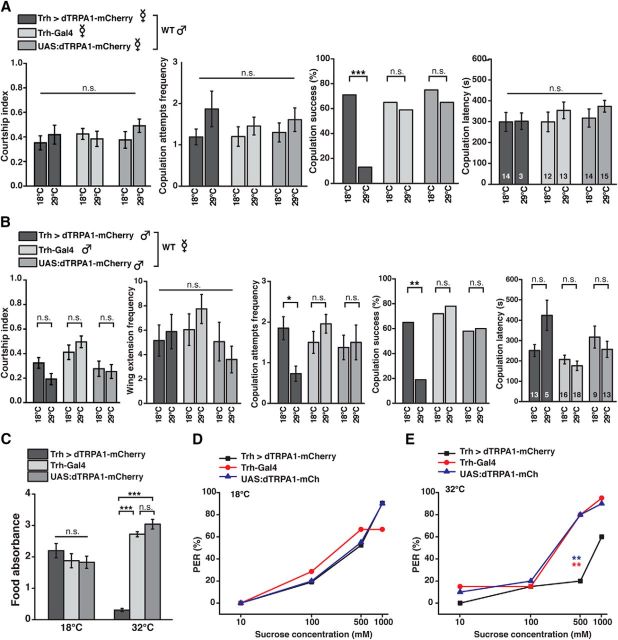Figure 5.
5-HT neurons reduce motivated behaviors and sensory responsiveness. A, Mating behavior of wild-type males toward virgin females expressing dTRPA1-mCherry under Trh-Gal4 control or toward genetic control strains was quantified at 18°C and 29°C. For neither female genotype, male courtship index, frequency of male copulation attempts, or copulation latency of those males that succeeded to copulate (n indicated within the bars) was significantly different between 18°C and 29°C. Copulation success (female receptivity) was significantly reduced due to thermogenetic activation of Trh-Gal4-positive neurons. n = 20–23. B, Mating behavior of males expressing dTRPA1-mCherry under Trh-Gal4 control or of genetic control strains toward wild-type virgin females was quantified at 18°C and 29°C. Thermogenetic activation of Trh-Gal4-positive neurons in males did not significantly reduce courtship index or wing extension frequency, but copulation attempts frequency and copulation success (n = 16–23). Those males that succeeded to copulate showed no statistically significant difference at the given sample size (n indicated within the bars). C, Food uptake is significantly reduced in starved flies expressing dTRPA1-mCherry under control of Trh-Gal4 at 32°C, but not at 18°C (n = 5). D, E, Sucrose-induced proboscis extension reflex (PER) was quantified at 18°C (D) and 32°C (E) in flies expressing dTRPA1-mCherry under control of Trh-Gal4 and in genetic control strains. Thermoactivation of 5-HT neurons shifts gustatory responsiveness toward higher sucrose concentrations (n = 20 or 21). Bars and data points indicate means; error bars indicate SEM. n.s., Not significant (p > 0.05). *p < 0.05. **p < 0.01. ***p < 0.001.

